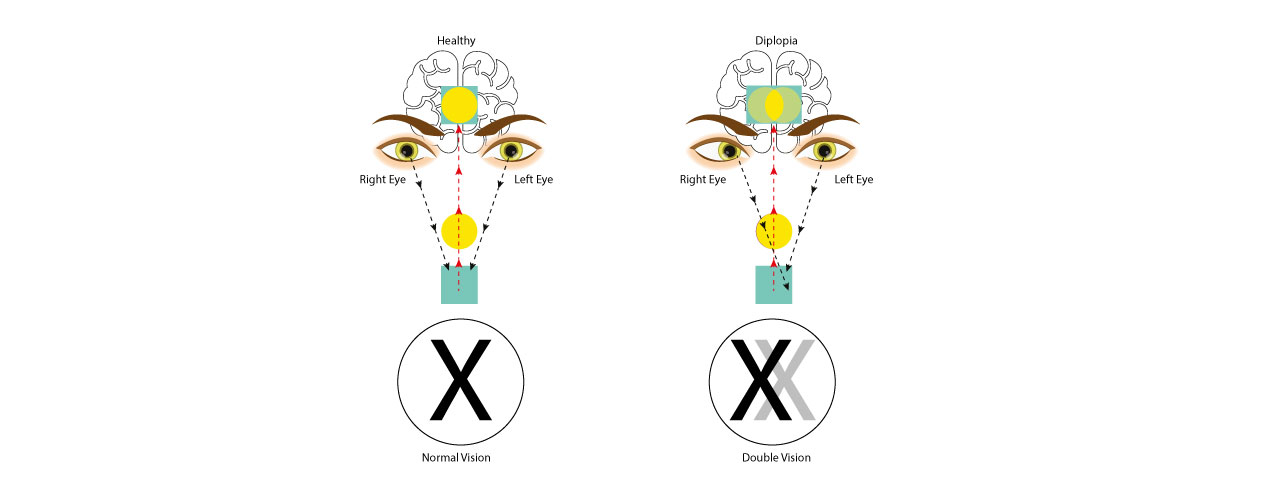Double Vision/ Diplopia Treatment in Delhi
Double Vision/Diplopia Treatment in Delhi: Child Eye Specialist
Double vision happens once an individual sees a double image wherever there ought to solely be one. The double picture seen at the same time on different sides seems like a blurry vision The condition will affect balance, movement, and reading ability.
Here are some points about double vision:
• Diplopia, or Double vision, may outcome from a spread of underlying conditions.
• Double vision will affect only one eye or each.
• A childhood squint, will generally recur and cause diplopia.
• Alcohol or recreational medicines cause temporary diplopia.
• Treatments will embrace surgery, eye exercises, or corrective lenses.
Types of Double Vision:
• Binocular double vision: The one and other eyes don't work along as they must, and double vision disappears if you enclose one eye.
• Monocular double vision: Diplopia is present only in one eye, which results in a ghosting impact wherever the double image is only slightly separated.
• Physiological double vision: It happens once solely background images, or pictures not being targeted, seem to be doubled. this kind of double vision is sometimes the problem once a kid mentions seeing double.
Double Vision or Diplopia - Symptoms
You may notice such symptoms while Double vision or Diplopia
• Unlighnment of one or both eyes (a "wandering eye" or "cross-eyed" look)
• Pain once you move your eyes
• Discomfort around your eyes, like in your temples or eyebrows
• Headache
• Nausea
• Weakness in your eyes or any part else
• Floppy eyelids
Is there any prevention of Double Vision (Diplopia)?
Preventing Double Vision starts with preventing the underlying cause. Here child eye specialists mention some points or tips to get your eyes healthy:
•Control your Diabetes: Patients following treatment plans have a lower risk of developing diplopia. Plus, type 2 diabetes relates to direct lifestyle, those people who take care of their diet and eat healthily, maintain health do plenty of exercise, and balance their body weight are much less likely to develop diabetes and double vision disorder
•Prevent the expansion of opacity: Keep your eyes healthy and avoid cataracts by sporting eyeglasses, refraining from smoking, and eating a healthy diet.
•Soothe dry eyes: Keeping your eyes well-lubricated will facilitate diplopia. Also, an effort to minimize eye strain from prolonged laptop or desktop use may cause dry eyes.
•Protect yourself from head injuries: Protect yourself from head injuries ad for wearing a seatbelt or helmet while driving a vehicle and using quality headgear and glasses while using machinery or playing sports.
Treatment & Diagnosis for Double Vision/ Diplopia
If you've got diplopia, the underlying cause is perhaps minor, like astigmatism or dry eyes. For additional complicated causes like diabetes or other disease, maybe you require treatment from ophthalmologists.
Or, you require emergency treatment if your condition is serious, like a brain or cancerous tumor.
Depending on the symptoms of your double vision, our eye specialists could consult one or further treatments:
1) obstruction or blurring of the vision of one or both eyes of Diplopia, using:
•An eye patch
•An occlusive lens, either a contact lens applied to glasses
•A Fresnel prism, put it to glasses
2) Injecting (Botox) Botulinum toxin into the stronger muscle eye to relax it and get the weaker eye to recover. Botulinum toxin short-term or permanent treatment, contingent on the underlying condition.
3) With surgery to treat some muscular issues (less common)
4) Treating further medical conditions by coordinative care with other Stanford specialists, including:
•A diabetologist: Degree specialist specializing in diabetes disorder for patients who have diabetes complaint
•An ear, nose, and throat specialist for patients who have sinus conditions or facial fractures
• A specialist specializing in thyroid disorders for patients who have Graves‘ disorder
•A neurologist doctor for patients with myasthenia or harm to cranial nerves that manage eye movement
• A specialist for patients who have cancer in the brain
Feel free to Contact us at +91-8130780790 for your Child Eye Problems and Eye Surgery.




